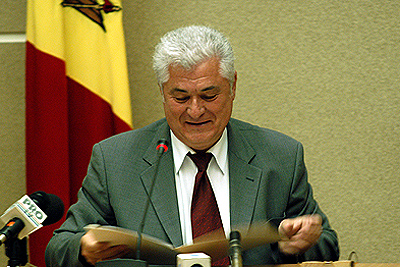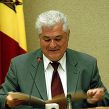
KYIV-TBILISI-CHISINAU TRIANGLE: COMMON APPROACH TO COMMON PROBLEMS
Publication: Eurasia Daily Monitor Volume: 2 Issue: 41
By:

Ukrainian President Viktor Yushchenko is holding meetings in Kyiv today (March 1) with Moldovan President Vladimir Voronin and Georgian Prime Minister Zurab Noghaideli. Their agenda includes energy supply, border security, anti-smuggling efforts, and revitalizing the GUAM (Georgia-Ukraine-Azerbaijan-Moldova) group of countries. Tomorrow Georgian President Mikheil Saakashvili will arrive in Chisinau for a working visit that includes meetings with President Voronin and opposition Christian-Democrat People’s Party leader Iurie Rosca.
Saakashvili and Voronin are scheduled to sign a “Chisinau Declaration on the Supremacy of Democratic Values” and a “Declaration on the ‘Black Holes’ in Europe.” The first document, a follow-up to the Yushchenko-Saakashvili “Carpathian Declaration” signed in January in Ukraine, commits Moldova alongside Georgia to “recognizing representative democracy to be the most effective model of sound, good governance.” It goes on to express the common belief that “only Democracy can guarantee true state-building through strengthening civil society and its institutions . . . in the countries that have emerged from totalitarian dictatorship and foreign rule.”
Clearly alluding to the Russian government’s ongoing campaign to lift its Moldovan “centrist” allies to power in the upcoming general elections, the declaration asserts, “No external forces can prevent the freedom-loving peoples from voting . . . in accordance with their beliefs. No outside force should be allowed to impose its will on the people, no one should be allowed to influence the outcome of the elections and try to change the political course of the country through economic blackmail and all kinds of illegal operations.”
Thus far, no Western institution, government, embassy in Chisinau, or Western election observers have commented on Moscow’s and Tiraspol’s massive political and media offensive to manipulate Moldova’s elections. There are growing indications that Russian and Transnistrian intelligence services plan to infiltrate and hijack any post-election street demonstrations. This is why the joint Georgian-Moldovan declaration is “asking the democratic world to shield us from illegal interference from the enemies of freedom and forces trying to impose any kind of imperialistic policies. Taking into consideration that Moldova has insisted that the largest possible number of election observers from Western democracies should come to the country, we trust these observers to impartially monitor the elections.”
Advancing from rule by Moscow-supported corrupt clans to real statehood is a further challenge to both countries. Thus, “We trust that the new government of Moldova will come to power as a result of free and fair elections, not through external threats of economic sanctions and the attempts of corrupt clans to return to power with support from yesterday’s masters.”
The “Declaration on the ‘Black Holes’ in Europe” reflects Georgia’s and Moldova’s analogous problems in Transnistria, Abkhazia, and South Ossetia. The document anticipates joint political efforts in facing “threats to international peace and security stemming from armed separatism” and “resolving the externally inspired protracted conflicts in both our countries.” It reminds the international community that the secessionist enclaves, “openly supported from the outside, have become crime zones,” posing region-wide threats to stability. They also threaten national identities: “in Transnistria, the use of the Moldovan language is sharply restricted, schools are persecuted, the Latin alphabet banished; and in the Gali region of Abkhazia, teachers are prohibited from teaching their students in their native Georgian language.”
The document observes that the “presence and direct involvement of Russian military forces in Georgia and in Moldova has become the main catalyst of these conflicts. Therefore, the speedy removal of the Russian forces represents the common interest of our countries and that of the entire region . . . This is not only our local problem, but a problem for the entire Europe.” Successful political resolution of these conflicts would “enable our countries to become integrated into Wider Europe, to deepen our cooperation with the Euro-Atlantic community.”
Consequently, Georgia and Moldova will “undertake joint diplomatic steps in international forums” on these issues. Far from viewing the populations in these territories as enemies, Tbilisi and Chisinau appeal to them “to rejoin us in the framework of democratic states and of peaceful Europe. Joining Europe is Georgia’s and Moldova’s uppermost goal. Let all of us join Europe together.”




